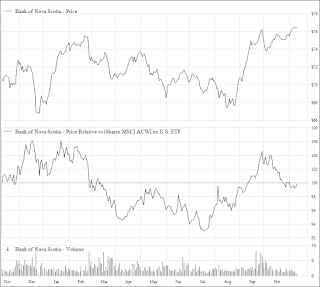By:
Dominic Maio, AIM Student at Marquette University
Disclosure:
The AIM Equity Fund currently holds this position. This article was written by
myself, and it expresses my own opinions. I am not receiving compensation for
it and I have no business relationship with any company whose stock is
mentioned in this article.
Summary
• Bank of Nova Scotia
(NYSE: BNS) The Bank of Nova Scotia is a multinational bank
headquartered in Toronto, Canada and was founded in 1832. Scotiabank
is one of the big 5 banks of Canada. BNS engages in a wide range of
financial services and products including wealth management, private banking,
commercial banking, investment banking, and capital markets. These services are
primarily offered to retail, commercial, and corporate customers.
• BNS has maintained a
strong capital position over the past five years and continues to operate at a
CET 1 ratio of 11.2% as reported in Q3. The strong ratio can be contributed to
increasing cash flows organically and divestures from current operations.
• BNS’s international
banking segment continues to see growth year over year with a 14% increase in
Q3 to $616 million. The increase is driven by increased loans and acquisitions
in the Pacific Alliance Countries.
• BNS has invested
heavily into FinTech, which is expected to see large growth in the nearby
future. With the company being the industry leader in Canada through the launch
of their mobile banking app, BNS is expected to capture a large portion of the
demand.
• BNS saw a 9.76% CAGR in
Net Income between year ends 2014 and 2018, and with strong growth in 2019 so
far, the number can be expected to grow in the future.
Key
points:
BNS was added to the AIM International Portfolio in
November of 2018 at $53.38 with a price target of $65.57. The investment
thesis placed a forward-looking emphasis on strong capital position. Since the
addition of the company to the portfolio, BNS has capitalized on this area. BNS
has managed to maintain strong capital positioning with a CET 1 capital ratio
of 11.2% an increase of 10 basis points from the prior quarter. This increase
can be contributed to continual growth in cash flows driven by strong internal
capital generation and divestures of current operations. In Q3, BNS
announced the sale of its operations in Puerto Rico and the U.S. Virgin
Islands, which is projected to increase available capital significantly moving
forward. With extra available capital, BNS has been able to increase
dividend yields by 6%, and investments into their international banking
segment. The bank of Nova Scotia expects the CET 1 ratio to remain above 11%
moving forward.
BNS has seen strong growth
in International banking by delivering another quarter of double-digit earnings
growth with adjusted earnings up 14% YoY, offering diverse revenue streams. Acquisitions
have played essential in this segment's growth. BNS has invested heavily in the
Pacific Alliance Countries, with over 6 acquisitions since 2018. The
growth in International Banking has led to an increase in both
Non-Interest Income and Net Interest Income. Net Interest Income has increased
$289 million in Q3, due to an increase in commercial and retail lending in the
Pacific Alliance Countries. Additionally, Non-Interest income was up $189
million driven by global acquisitions in the Dominican Republic and Peru. With
a 5-year net income CAGR of 9.76%, International Banking will continue increasing
EPS through acquisitions, projecting a $0.70 increase by 2021.
Moving forward, BNS looks
to capitalize on the growing movement of FinTech. With FinTech expected to grow
by a forecasted 5-Year CAGR of 22.7%, BNS looks poised to capture the rise in
demand. In Q3, the company was recognized as the industry leader in mobile
banking by J.D. Power and launched a new mobile banking app in Canada. By
capitalizing on this area, BNS should see tremendous growth with a forecasted
5-Year CAGR of 3.32% in net income.
What
has the stock done lately?
Following the Q3 earnings
call, BNS has seen an 11.29% increase in the stock price from $51.48 to $57.83
due to significant growth in the International Banking Segment. In the
last month, BNS’s stock has risen by 1.99% peaking at $58.00. The most recent
increase can be contributed to the integration of the mobile banking app
launched towards the end of Q3, which in the last month has seen tremendous
growth.
Past
Year Performance:
BNS has seen steady growth over the past
year with a 52 week range from $48.34 to $58.22 (November 2018-November 2019).
The low came in December of 2018 due to a downturn in the markets and as a
result of the Q4 earnings call. BNS’s stock has seen an increase of 7.97% over
the past year and shows positive signs of growth. Given a dividend yield of
4.6% and a P/E ratio of 10.05 (2% lower than peers), the stock is still showing
signs of being undervalued as compared to peers.
1
Year Stock Chart vs. Benchmark from FactSet here
Source:
FactSet
My
Takeaway
BNS should remain in the
AIM International Portfolio. After 4 consecutive misses on earnings, BNS
finally got on track in Q3 with an adjusted EPS of $1.88, 2% above consensus.
The company is positioned for growth moving forward due to a strengthened risk
profile from their latest divestures, mobile banking, and through the
integration of several acquisitions in their International Banking Segment. In
addition to mobile banking, International Banking will also drive the company
moving forward, after continual growth in the past five years and 6
acquisitions into the segment since 2018. With the combination of strategic
acquisitions in International Banking, strong capital positioning, and the rise
of FinTech, BNS will maintain strong growth in the foreseeable
future.
1
Month Stock Chart from FactSet
Source:
FactSet











